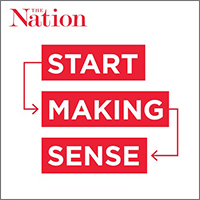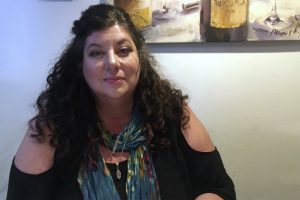 Listen HERE
Listen HERE
Did Joe Biden sexually assault Tara Reade in 1993? Katha Pollitt examines the evidence—and concludes that it supports Biden’s denial. Especially significant: the PBS NewsHour interviews with 74 former Biden staffers, of whom 62 were women; none said they had experienced sexual harassment, assault or misconduct by Biden. All said they never heard any rumors or allegations of Biden engaging in sexual misconduct, until the recent assault allegation made by Tara Reade.
What to watch, and read, while the stay-at-home orders are in effect: John Powers recommends “The Sleepers,” a Czech spy thriller, on HBO GO, and the 1950s Hollywood noir novels of the amazing Alfred Hayes, from New York Review Classics. John is Critic at Large on Fresh Air with Terry Gross on NPR. 5-21-2020
Start Making Sense
The fight for universal vote-by-mail: David Cole, plus Katha Pollitt on right-wing women
 Listen HERE
Listen HERE
Universal vote-by-mail: it’s obviously necessary for our Nov. 3 election, but Trump, of course, is against it. He said that if we were to adopt voting by mail, “you’d never have another Republican elected in this country again.” David Cole explains why it’s essential for our democracy—and why Trump is wrong that it would bring the end of the Republican party. David is National Legal Director of the ACLU, and legal affairs correspondent for The Nation.
Also: Katha Pollitt talks about right-wing women. We’ve never forgotten that, in 2016, exit polls showed that 53 percent of white women voted for Donald Trump rather than Hillary Clinton. Now there’s a TV miniseries about beginnings of the political organizing of right-wing women: it stars Cate Blanchett as Phyllis Schafly, and it’s called “Mrs. America.” 5/14/2020
Fighting for the Soul of the Democratic Party: John Nichols, plus Amy Wilentz on Jared and Ivanka
 Listen HERE
Listen HERE
Before Bernie and AOC, before Jesse Jackson and George McGovern, there was Henry Wallace, FDR’s vice president, who fought for the soul of the Democratic party in the 1940s. John Nichols tells that story, and links it to today’s battles between progressives and Wall Street Democrats—his new book, out this week, is “The Fight for the Soul of the Democratic Party.”
Also: a new episode of “The Children’s Hour” with Amy Wilenz, stories about Ivanka, Jared, Don Junior, and little Eric–boy are those kids in trouble this week! Amy of course is our Chief Jared Correspondent—and was just awarded a Guggenheim fellowship. 5-7-2020
Mike Davis: Back to Work in the Covid-19 Economy? Plus John Powers on Virus Time TV
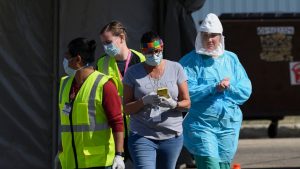 Listen HERE
Listen HERE
Minnesota’s back-to-work plan is a lot better than Georgia’s, Mike Davis says – it requires employers to provide PPE and bans face-to-face activity—i.e. the restaurants, shopping malls, and tattoo parlors that Georgia and South Carolina have opened. Mike’s book The Monster at Our Door examined the avian flu.
Also: John Powers, critic-at-large for Fresh Air with Terry Gross on NPR, recommends “The Good Fight” and “The Bureau” for virus-time TV watching.
4-30-2020
Joseph Stiglitz: What Workers Need Right Now; plus Katrina Vanden Heuvel on Solidarity
 Listen HERE
Listen HERE
Nobel Prize-winning economist Joseph Stiglitz says the US has “one of the poorest systems of unemployment insurance in the world”—and that our number one priority should be to keep workers connected to their jobs. His book People, Power and Profits: Progressive Capitalism for an Age of Discontent is out now in paperback, with a new preface.
Also: Katrina vanden Heuvel talks about solidarity with the front-line workers fighting the virus—starting in New York, where people cheer hospital workers coming off their shifts at 7pm every night. 4-22-2020
Mike Davis: Is Coronavirus Ushering in a New World Order? plus Barbara Ehrenreich on low-wage work
 Listen HERE
Listen HERE
Mike Davis talks about the fragmentation of Europe, the marginalization of the WHO, the danger to Africa, and whether China will emerge less powerful in the world economy because of the rise of economic nationalism. Mike wrote about the avian flu in The Monster at Our Door.
Also Barbara Ehrenreich reports on her experiment in trying to survive on low wage work. Her classic essay, “Nickel and Dimed,” is the lead piece in her new book, a collection of essays titled Had I Known. We recorded this interview when Nickel and Dimed was published, in 2002. 4-16-2020
What the Pentagon Knew about the Coronavirus—in 2017: Ken Klippenstein, plus Amy Wilentz on Jared and Laila Lalami on “The Other Americans”
 Listen HERE
Listen HERE
The Military Knew Years Ago That a Coronavirus Was Coming. The Pentagon warned the White House about a shortage of ventilators, face masks, and hospital beds in 2017, according to a document obtained by Ken Klippenstein, The Nation’s Washington Correspondent – but of course Trump ignored the warning.
Also: Jared Kusher has a new job on the White House coronavirus task force—and Ivanka is at home, reading “The Odyssey” and playing the guitar. Amy Wilentz comments – she’s our Chief Jared Correspondent.
Plus: Nation columnist Laila Lalami talk about her novel “The Other Americans”–it’s about the suspicious death of a Moroccan immigrant in a small town in California. It’s a family saga, a murder mystery, and a love story. And it’s out now in paperback. 4-3-2020
Mike Davis: Science v. Politics of the Coronavirus; plus Rebecca Solnit on Becoming a Feminist
 Listen HERE
Listen HERE
Mike Davis talks about who gets forgotten in a pandemic—and about the political, and economic, obstacles to making faster progress on effective anti-viral medication and a vaccine. Mike is the author of many books, including City of Quartz and The Monster at Our Door: The Global Threat of Avian Flu.
Also: Rebecca Solnit talks about how she became a feminist, and a writer—in San Francisco in the eighties, “the queerest city in the world.” Her new book, a memoir of sorts, is Recollections of My Nonexistence. 4/2/20
E.J. Dionne: The Coronavirus and the election; plus Melina Abdullah on Black Lives Matter and Katha Pollitt on “Contagion”
 Listen HERE
Listen HERE
What’s our strategy for beating Trump in November? Is the Coronavirus making that easier, or harder? E.J. Dionne analyzes the effect of the virus on politics – he’s a columnist for the Washington Post, and his new book is Code Red: How Progressives and Moderates can Unite to Save Our Country.
Also: How the coronavirus is changing the issues, and the tactics, of Black Lives Matter – a conversation with Melina Abdullah, one of the founders of the LA chapter and a professor of Pan-African Studies at Cal State LA.
Plus: Katha Pollitt has some recommendations about what to watch, and read, during those days at home, starting with the classics–Defoe’s “Journal of the Plague Year” and “The Decameron” by Boccaccio. 3/25/20
Paul Krugman: The Coronavirus and the Economic Crisis; plus John Nichols on elections and Amy Wilentz on the Kushners and the Coronavirus
 Listen HERE
Listen HERE
Paul Krugman, the New York Times columnist and Nobel Prize winning economist, says we don’t have an easy way of responding to the economic threats posed by the coronavirus, and Trump’s preoccupation with the stock market is a big mistake. Krugman’s new book is Arguing with Zombies: Economics, Politics, and the Fight for a Better Future.
Also: we’ll talk about the Republican senators who say paid sick leave for people with the coronavirus will “make workers lazy”—that’s what Ron Johnson says, he represents Wisconsin, and we’ll talk about that with our man in Madison, John Nichols. John also examines everything that went wrong with Tuesday’s elections, and talks about what we must do to ensure there’s no postponement of the November election.
And we’ll also talk about the Kushners and the coronavirus: Jared has been working in some unusual ways, and there’s also virus news about Ivanka and Don Junior. Amy Wilentz reports—she’s our Chief Jared Correspondent. 3/18/2020
